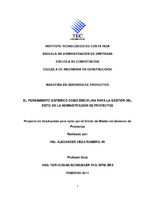Mostrar el registro sencillo del ítem
El pensamiento sistémico como disciplina para la gestión del éxito de la administración de proyectos
| dc.contributor.author | Vega-Romero, Alexander | |
| dc.date.accessioned | 2015-04-14T18:07:18Z | |
| dc.date.available | 2015-04-14T18:07:18Z | |
| dc.date.issued | 2011 | |
| dc.identifier.uri | https://hdl.handle.net/2238/5752 | |
| dc.description | Proyecto de Graduación (Maestría en Gerencia de Proyectos Empresariales y Gerencia de Proyectos de Tecnología de Información) Instituto Tecnológico de Costa Rica, Escuela de Administración de Empresas, 2011. | es |
| dc.description.abstract | This paper is a literature review and analysis of experience in projects on the application of systems thinking as an integral way of achieving best practice of professional project management, taking into account that projects are systems and also forms part of systems where all major component parts do not act in isolation but interact with each other and therefore can’t be given a project by parties, but to be managed under a comprehensive approach where you need a holistic view of project and environment. The study is based on a literature review of general systems theory work product developed by Ludwig Von Bertalanfy and later studies by other authors such as Jay Forrester, Peter Senge and Enrique Hersher among others. Also it was conducted an analysis of various references on the professional practice of project management such as the PMBOK, the Project Manager Institute, among others. The study of these references, analysis and review of experiences in real projects were established implementation aspects of systemic thinking to professional project management as a way to get to understand how projects should be managed with a clear understanding of their interactions with the environment, without assuming that projects are isolated efforts but there are many aspects that affect it and which are not always identified even when applying the techniques and tools provided in the guidelines or project management literature. The main conclusion of this work is that projects can’t be managed only with a loyal following of guidelines and techniques suggested in the literature but should be kept in mind that the projects involve a large number of actors interacting with each other and outwards which causes the existence of a number of variables that the project manager must be present and be in constant observation of how the environment appears more distant in time and space is able to modify your project. | es |
| dc.description.sponsorship | Instituto Tecnológico de Costa Rica. Área acádemica de Gerencia de Proyectos. Escuela de Administración de Empresas. | es |
| dc.language.iso | es | es |
| dc.publisher | Instituto Tecnológico de Costa Rica | es |
| dc.rights | acceso abierto | es |
| dc.subject | Costos | es |
| dc.subject | Enfoque sistémico | es |
| dc.subject | Aprendizaje | es |
| dc.subject | Tiempo | es |
| dc.subject | Calidad | es |
| dc.subject | Recursos humanos | es |
| dc.subject | Riesgos | es |
| dc.title | El pensamiento sistémico como disciplina para la gestión del éxito de la administración de proyectos | es |
| dc.type | tesis de maestría | es |


